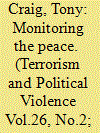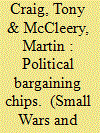| Srl | Item |
| 1 |
ID:
129118


|
|
|
| 2 |
ID:
132301


|
|
|
|
|
| Publication |
2014.
|
| Summary/Abstract |
During the Provisional IRA's (PIRA) 1975 ceasefire, two different sets of incident centres were established across Northern Ireland in order to monitor and avert escalation of violence between Republicans and Security Forces. While one group of offices was run by the Northern Ireland Office (NIO) and administered by clerks in the Northern Ireland Civil Service, very quickly Sinn Féin (taking advantage of their decriminalisation in 1974) established their own incident centres to coordinate their communication with the government. This article argues that the establishment of the Sinn Féin incident centres set a precedent for the future political activity of the Provisional Republican Movement; that their activity during the 1975 ceasefire played an important formative role in the evolution of the group's political strategy; and that this experience, acquired from the work done during the 1975 truce, was of far greater influence than is appreciated in current accounts.
|
|
|
|
|
|
|
|
|
|
|
|
|
|
|
|
| 3 |
ID:
173848


|
|
|
|
|
| Summary/Abstract |
From March 1972 until internment itself was eventually abandoned in December 1975 successive Secretaries of State for Northern Ireland used their powers to arrest and release republican internees. This article demonstrates that several factors contributed to the policy of controlling the arrests and releases of internees, and that the most important was not negotiations with the Provisional IRA (PIRA) but the need to encourage the engagement of moderate nationalists in an emerging political process. The story of internment is often exclusively seen in the narrower narratives of paramilitary historiography and the later ‘prison war’. This article adopts a broader contextual approach in which both moderate nationalist, and to a lesser extent, unionist concerns over arrests and releases are considered. In doing so, this work resituates the gradual ending of internment at the heart of the mainstream political discussions in Northern Ireland in the 1970s. The article also contends that this controlled use of internment as a political strategy ultimately proved to be successful for the British government in achieving their desired objectives.
|
|
|
|
|
|
|
|
|
|
|
|
|
|
|
|
| 4 |
ID:
097154


|
|
|
| 5 |
ID:
173926


|
|
|
|
|
| Summary/Abstract |
From the beginning of Northern Ireland’s Troubles, two different strands of British intelligence were developed in Northern Ireland that failed to effectively cooperate or coordinate their efforts with one another. Though central government was aware (and often opposed) the lack of singular control over intelligence in the province, they were unable to wrest control of security intelligence from the hands of the Army and Special Branch. This problem, meant that a Security intelligence ‘stovepipe’ emerged and that this stovepipe operated without reference (and at times in opposition) to policy initiatives also being pursued by the UK government at the time.
|
|
|
|
|
|
|
|
|
|
|
|
|
|
|
|